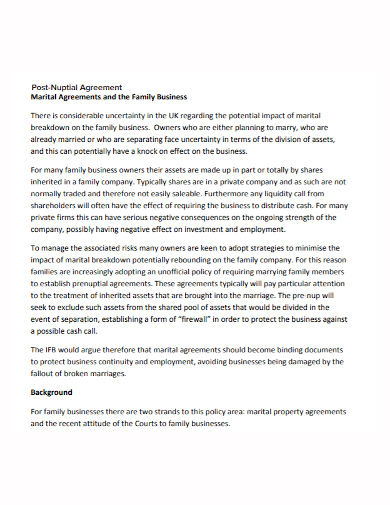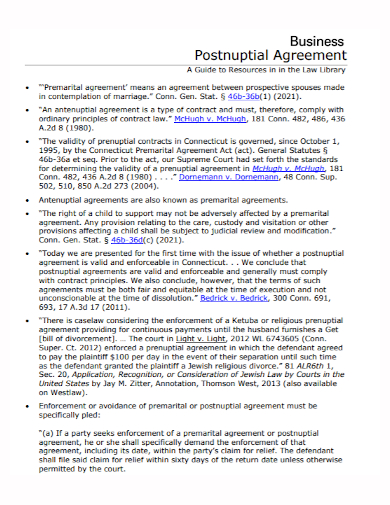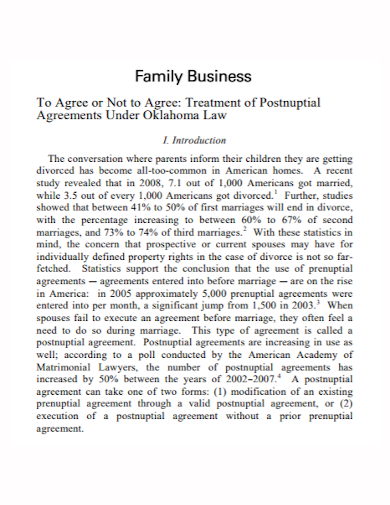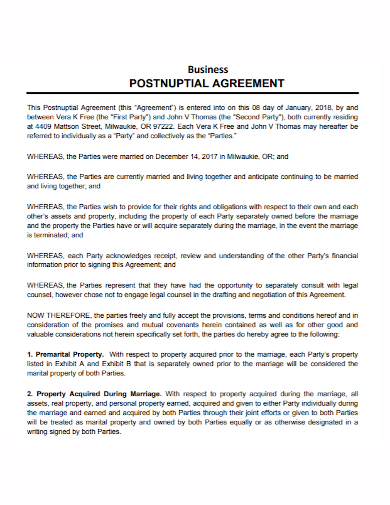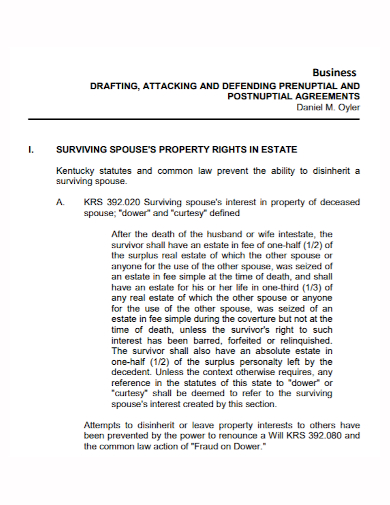Postnuptial agreements, like prenuptial agreements, allow a couple to relieve tension brought on by financial concerns. If the marriage ends, this type of contract will allow the spouses to establish an equitable distribution of assets. Postnuptial agreements, in particular, are frequently viewed as taboo or not in the spirit of love or companionship. According to critics, such contracts indicate that the couple expects their marriage to end in divorce. However, if a contract can alleviate financial hardship, the couple may choose to enter into one in the hopes of maintaining marital harmony.
5+ Business Postnuptial Agreement Samples
When a couple decides to marry, they must agree to divide their assets. These assets (property, bank accounts, debts, and so on) are subject to a 50/50 or “equitable” split in the event of a divorce (depending on the marital property laws of your state). However, in many states, couples have the option of entering into agreements that specify how property will be divided (among other things) if the marriage ends.
Prenuptial agreements (or “prenups”) are the most common, and they are entered into before a couple marries. However, “postnuptial” agreements, as the name implies, are entered into after a couple marries. A general overview of postnuptial agreements is provided in the following information.
1. Business Postnuptial Agreement Template
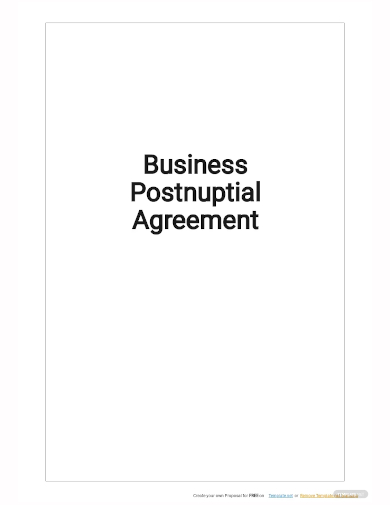
2. Family Business Postnuptial Agreement
3. Business Postnuptial Agreement
4. Business Postnuptial Treatment Agreement
5. Sample Business Postnuptial Agreement
6. Business Property Postnuptial Agreement
Basic Requirements
Postnuptial agreements must meet the following basic requirements to be valid and enforceable:
- Postnuptial agreements that are not written will not be considered valid. Written postnuptial agreements are required.
- Voluntary – A postnuptial agreement must have been signed voluntarily and intentionally by both parties. A postnuptial agreement will be null and void if there is any evidence that one spouse coerced or threatened the other into signing it.
- Another element of valid and enforceable postnuptial agreements is full and fair disclosure. Each party must make full and fair disclosure of his or her assets, liabilities, and income to the other at the time the agreement is signed. Because postnuptial agreements are developed to spell out how assets, liabilities, and support would be handled if the marriage ended, it’s important to understand this. The agreement will be unenforceable if one party relied on inaccurate or incomplete information.
- Fair – Unconscionable postnuptial agreements must be avoided. Based on the facts and circumstances, a postnuptial agreement that is blatantly one-sided or otherwise extremely unjust toward one party will not be enforceable.
- Validly executed – Postnuptial agreements must comply with the laws of the parties’ respective states. In general, both parties’ signatures must be notarized in order for a postnuptial agreement to be valid. Additional requirements, such as witnessing the parties’ signatures, may be imposed by some state laws.
Postnuptial agreements can be used for a variety of reasons. While not always the case, one of the more well-known reasons for obtaining a postnuptial agreement is in the event of marital problems. Because some states mandate that each spouse be represented by a different attorney, it’s critical to first learn about your state’s requirements and then find the appropriate representation.
Prospective clients can expect to provide their attorney with a list of all of their assets and then have discussions about their goals and concerns. Experts say that in the vast majority of marriages, a prenuptial or postnuptial agreement can be beneficial, but the first step is to consult with an attorney to see if such an agreement will help you achieve your goals.
FAQs
What are the items not covered by the postnuptial agreement?
Child custody and child support are examples of items that are not enforceable through a postnuptial agreement. A postnuptial agreement cannot include provisions that attempt to regulate routine aspects of a marital relationship. State laws will determine how a postnuptial agreement is enforced. Most courts will uphold agreements as long as they are in writing, signed without coercion, and include full financial disclosure on both sides. Some jurisdictions, however, erect additional barriers.
What is the difference between a postnuptial and a prenup?
Prenuptial agreements are very common among wealthy people, particularly in “community property” states, where marital property is split down the middle after a divorce. They’re also used when one party wants to protect a family business, avoid taking on the debts of the other party or clarify financial responsibilities during the marriage. Postnuptial agreements are similar to prenuptial agreements in that they typically address the same issues, but they are entered into after a couple has married (or joined in a civil union). While postnuptial agreements were once largely unenforceable, their popularity grew as more states adopted “no-fault” divorce laws in the 1970s.
You may want to consider a postnuptial agreement if you’ve decided after marriage that certain protections are necessary, or if you want assurances that you’ll be taken care of in the event of a divorce. It isn’t for everyone, but it can be very effective in certain situations.
Related Posts
FREE 10+ Mentoring Agreement Samples In MS Word | Apple Pages | PDF
FREE 10+ Partner Agreement Samples In MS Word | Google Docs | Apple Pages | PDF
FREE 10+ Individual Agreement Samples In MS Word | Google Docs | Apple Pages | PDF
FREE 10+ Strategic Agreement Samples In MS Word | Google Docs | Apple Pages | PDF
FREE 10+ Equity Agreement Samples In MS Word | Google Docs | Apple Pages | PDF
FREE 10+ Producer Agreement Samples in MS Word | Apple Pages | PDF
FREE 10+ Grant Agreement Samples In MS Word | Apple Pages | PDF
FREE 8+ Meeting Agreement Samples in MS Word | Google Docs | Apple Pages | PDF
FREE 10+ Community Agreement Samples In MS Word | Google Docs | PDF
FREE 8+ Real Estate Option Agreement Samples in MS Word | PDF
FREE 10+ Call Option Agreement Samples In MS Word | PDF
FREE 10+ Advertising Agreement Samples In MS Word | Google Docs | Apple Pages | PDF
FREE 10+ Car Agreement Samples In MS Word | Google Docs | Apple Pages | PDF
FREE 10+ Horse Agreement Samples In MS Word | Apple Pages | PDF
FREE 10+ Option Agreement Samples In MS Word | Google Docs | Apple Pages | PDF

